City Hall protests demand end to discrimination against Altgeld Gardens people
[Editor's Note: The following article and compilation of articles also appeared at our Web site on the last day of 2009. We will be overlapping articles each month as our Home Page reloads to the following month so our casual readers don't miss the pieces from the previous month].
Two weeks after they took their protests to the December 16, 2009 meeting of the Chicago Board of Education, students and families from the Altgeld Gardens public housing project on Chicago's far south side made a dramatic showing at City Hall the day before New Year's Eve, demanding in front of the mayor's office that they be allowed to use the mayor's Internet since there is none available in the huge sprawling area where they live.
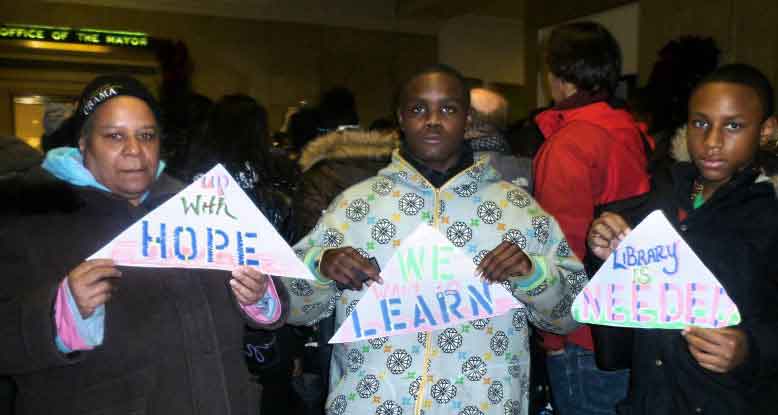 Altgeld Gardens parents and students protesting outside the "Office of the Mayor" at Chicago's City Hall on December 30, 2009. Substance photo by David Vance.The protesters were continuing an earlier protest they held at the Board meeting, when they received what they considered the brush off by Chicago Public Schools Chief Executive Officer Ron Huberman and other high-ranking officials of the city's huge school system.
Altgeld Gardens parents and students protesting outside the "Office of the Mayor" at Chicago's City Hall on December 30, 2009. Substance photo by David Vance.The protesters were continuing an earlier protest they held at the Board meeting, when they received what they considered the brush off by Chicago Public Schools Chief Executive Officer Ron Huberman and other high-ranking officials of the city's huge school system.
The December 30 protest, which highlighted the inequities of city policy in the treatment of African American communities that struggle with poverty, became a major news story during a slow news week. All of the city's major TV news departments, both daily newspapers, and several other new news outlets picked up the story. Although the problems outlined by the protesters had been growing for years, international media attention on the situation had begun with the September 24, 2009, murder of Fenger High School student Derrion Albert in a gang fight a half mile northeast of the school. The brutal murder, which was taped on a cell phone, was broadcast to millions of people in the USA and around the world while Chicago Mayor Richard M. Daley, Chicago Board of Education President Michael Scott, and President Barack Obama made a desperate pitch in Copenhagen that Chicago be allowed to host the 2016 Olympics. (Chicago was voted out of the Olympics during the first round of voting by the International Olympic Committee while thousands of people gathered in Chicago's Daley Plaza for the event watched the announcement in stunned silence).
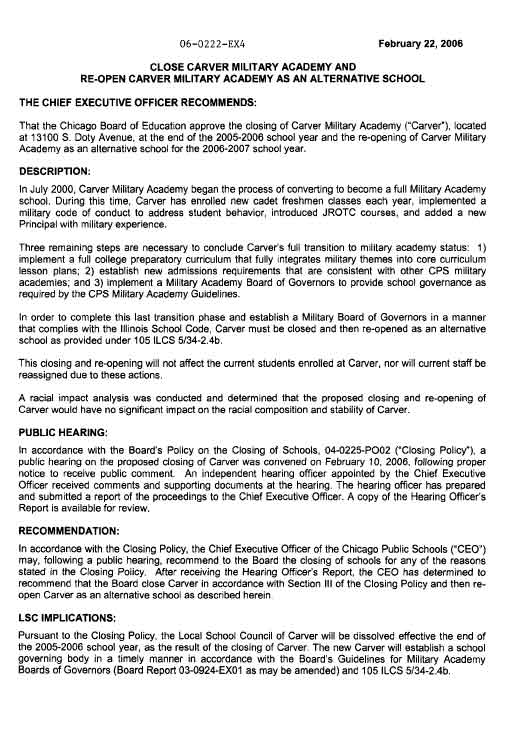 The Board Report closing Carver Area High School as a general high school after 40 years was signed by Arne Duncan and voted on by the members of the Board of Education on February 22, 2006. There was no discussion about the impact the closing of Carver would have on the students, then in grammar school, who lived in the Altgeld Gardens Housing Projects, except by the speakers at the hearings, all of whom opposed Arne Duncan's proposal to turn Carver into one of his military high schools. Substance graphic from the Agenda of the Chicago Board of Education meeting of February 22, 2006. The December 30 protest outside Daley's office in the corridor on the fifth floor at Chicago's sprawling City Hall continued as more and more public attention focused on the devastating impact of the policies of the Daley administration on the schools and children of Chicago's poorest families.
The Board Report closing Carver Area High School as a general high school after 40 years was signed by Arne Duncan and voted on by the members of the Board of Education on February 22, 2006. There was no discussion about the impact the closing of Carver would have on the students, then in grammar school, who lived in the Altgeld Gardens Housing Projects, except by the speakers at the hearings, all of whom opposed Arne Duncan's proposal to turn Carver into one of his military high schools. Substance graphic from the Agenda of the Chicago Board of Education meeting of February 22, 2006. The December 30 protest outside Daley's office in the corridor on the fifth floor at Chicago's sprawling City Hall continued as more and more public attention focused on the devastating impact of the policies of the Daley administration on the schools and children of Chicago's poorest families.
These city and federal policies have included more than 70 school closings (usually accompanied by privatizations through charter schools) and a simultaneous attack on public housing for poor people like the residents of Altgeld Gardens. Altgeld Gardens was the city's second largest public housing project (by population) and largest (in geographic area) before "housing reform" began to evict the residents over the past decade in programs that were begun during the administration of President Bill Clinton during the 1990s. The so-called "reform" of public housing, which mirrors the privatization of public education, was more extensive in Chicago than in any other city in the USA prior to the Bush administration's expansion of both through "No Child Left Behind" (for education) and a continuation of Democratic Party corporate reforms in housing and welfare.
One of the ironies of the December Board of Education meeting noted by some activists was the presence at the Board of former Chicago Housing Authority chief Phillip Jackson. Jackson, who during his time as Mayor Daley's CHA chief implemented the destruction of public housing for thousands of poor African American children and families, was at the Board meeting to protest the slim availability of magnet and selective enrollment school seats for African American children. 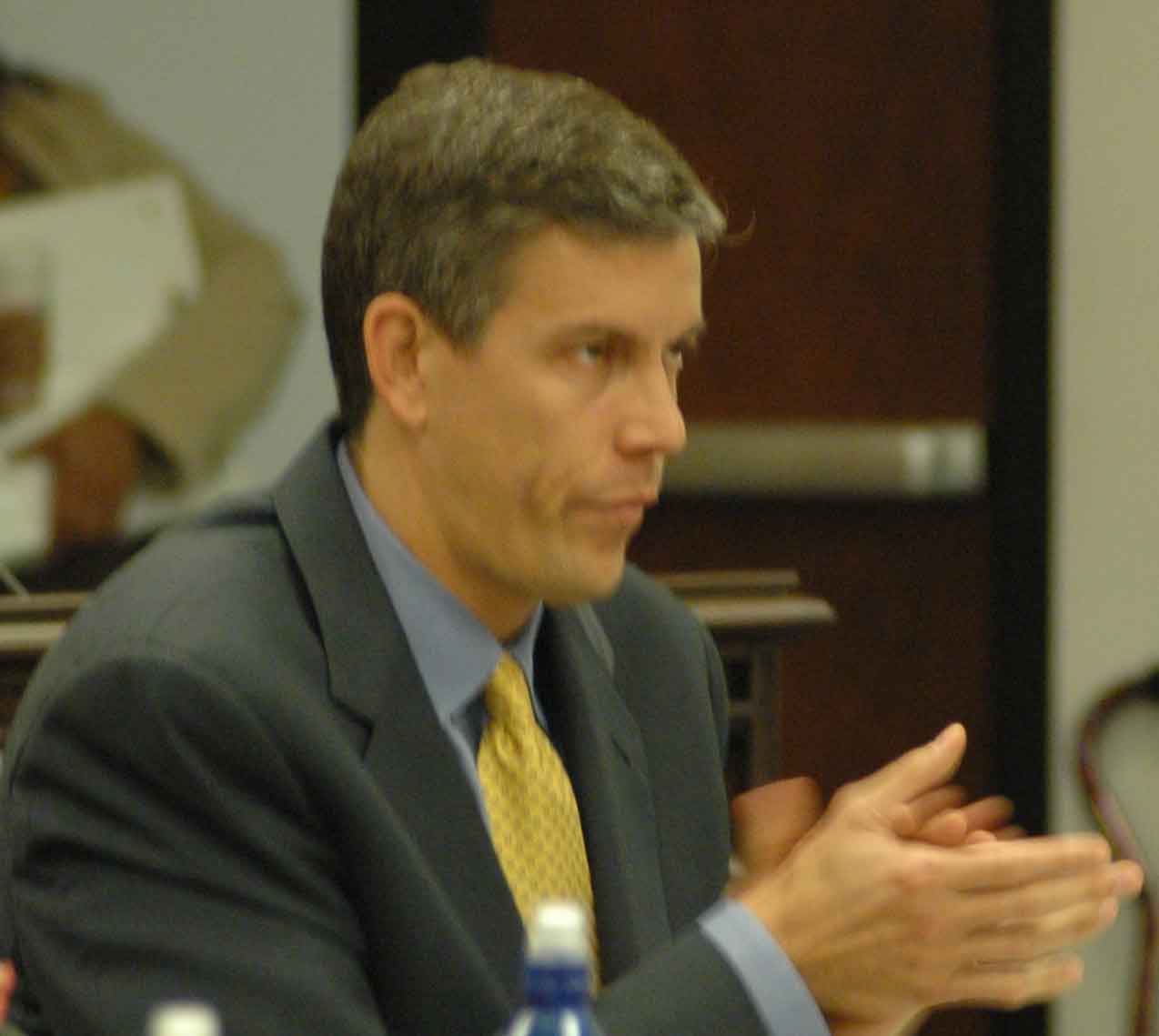 By the time of the September 2006 Board of Education meeting (above), Chicago Schools CEO Arne Duncan had closed (or begun the process of closing) more than 30 Chicago public schools. While most were vacated from their buildings, which were then privatized and turned over to charter schools, some, like Carver High School, were turned into military high schools, another project of the Duncan administration, following the leadership of Chicago Mayor Richard M. Daley. Although the people of the Altgeld Gardens public housing project did not want Carver closed as a general public high school, Duncan and the seven members of the Chicago Board of Education, led by then Board President Michael Scott, were successful in destroying Carver and its 40-year tradition and installing the "Carver Military Academy" in the building. Substance photo by George N. Schmidt. Critics noted that Jackson had been one of the key leaders in displacing poor people from public housing, which has since been privatized in many areas. Jackson's protests, as part of the "Black Star Project", gets widespread publicity from Chicago's corporate media, which never asks Jackson about his role in the destruction of public housing or his earlier years as Chief of Staff to the first "Chief Executive Officer" of Chicago's pubic schools, Paul Vallas. During the 1990s, Jackson was one of the most loyal lieutenants of Daley and the policies of the Daley administration in both housing and education. He refuses to discuss those historical years with Substance and relies on the other Chicago media to ignore them. CORPORATE AND COMMUNITY NEWS STORIES FOLLOW HERE;
By the time of the September 2006 Board of Education meeting (above), Chicago Schools CEO Arne Duncan had closed (or begun the process of closing) more than 30 Chicago public schools. While most were vacated from their buildings, which were then privatized and turned over to charter schools, some, like Carver High School, were turned into military high schools, another project of the Duncan administration, following the leadership of Chicago Mayor Richard M. Daley. Although the people of the Altgeld Gardens public housing project did not want Carver closed as a general public high school, Duncan and the seven members of the Chicago Board of Education, led by then Board President Michael Scott, were successful in destroying Carver and its 40-year tradition and installing the "Carver Military Academy" in the building. Substance photo by George N. Schmidt. Critics noted that Jackson had been one of the key leaders in displacing poor people from public housing, which has since been privatized in many areas. Jackson's protests, as part of the "Black Star Project", gets widespread publicity from Chicago's corporate media, which never asks Jackson about his role in the destruction of public housing or his earlier years as Chief of Staff to the first "Chief Executive Officer" of Chicago's pubic schools, Paul Vallas. During the 1990s, Jackson was one of the most loyal lieutenants of Daley and the policies of the Daley administration in both housing and education. He refuses to discuss those historical years with Substance and relies on the other Chicago media to ignore them. CORPORATE AND COMMUNITY NEWS STORIES FOLLOW HERE;
Mayor Daley: We Want To Use YOUR Internet! « Chicago Labor & Arts ...
By Lew Rosenbaum
As Substance News has reported (see Jim Vail’s article at http://www.substance news.net/ articles.php? page=1022§ion=Article on the Substance News Web site) the Chicago School Board met last week and was confronted by hundreds of people protesting Board policies.
Parents and students from Altgeld Gardens on Chicago’s far south side were joined by members of GEM (Grassroots Education Movement), Teachers for Social Justice, CORE (Caucus Of Rank-and-file Educators), Kenwood-Oakwood Community Organization (KOCO) and others to demand that CPS place a quality neighborhood public school in the building that houses Carver Military Academy.
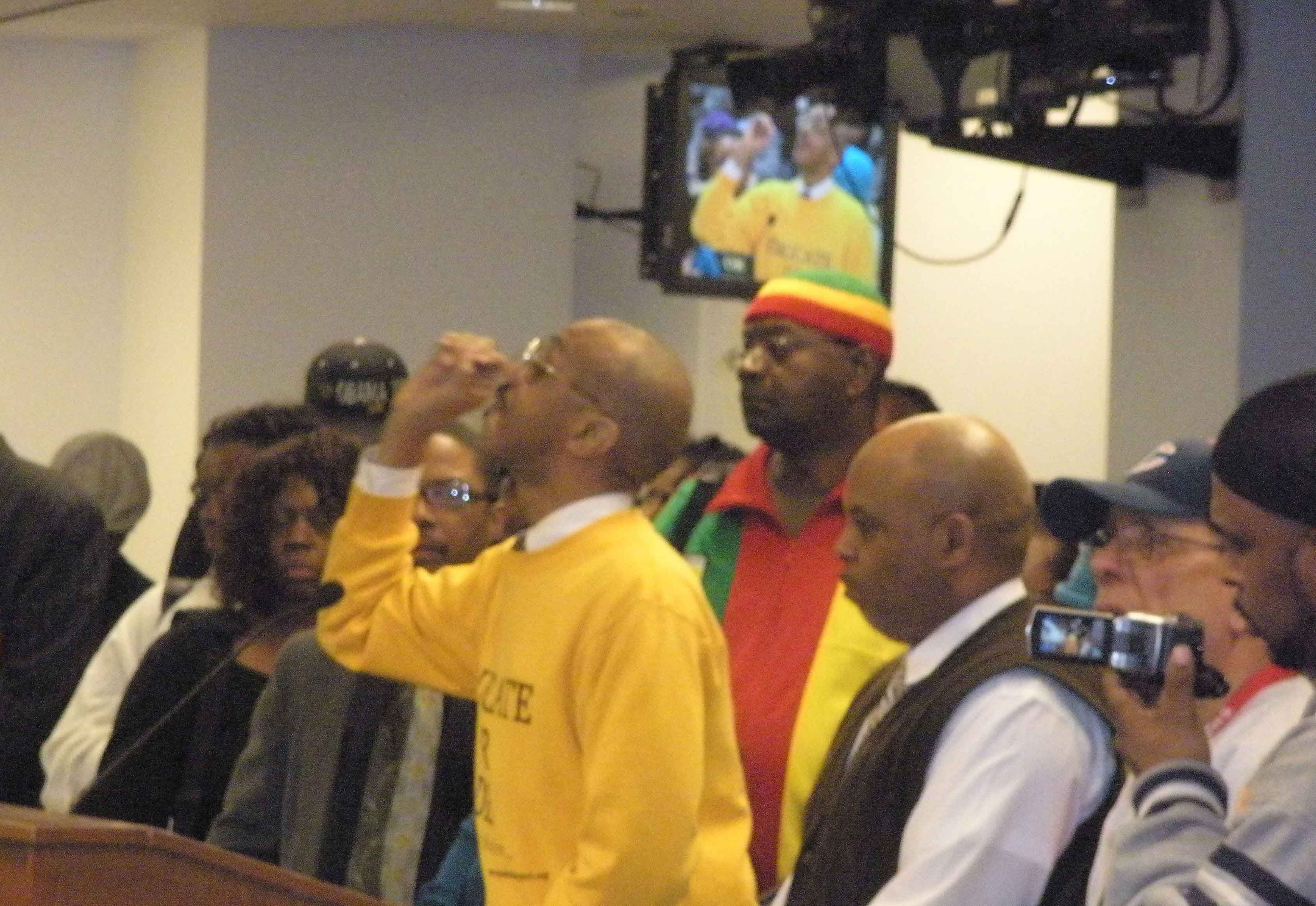 Part of the problem or part of the solution? After telling the media, which reports on his claims, that he would bring 1,000 protesters to the December 16, 2009, meeting of the Chicago Board of Education to speak out against the Board's revised non-desegregation "desegregation" plan, Black Star Project chief Phillip Jackson (above, with fist raised) denounced Chicago's general high school, ignored the city's massive segregation, and directed his remarks to getting more children into the city's small number of selective enrollment and magnet schools. Before be became a community activist, Jackson was a top aide to Mayor Richard M. Daley in both corporate "school reform" (he served as Chief of Staff to Paul Vallas, first CEO of CPS) and "housing reform" (Daley made him head of the Chicago Housing Authority after he left the school system). Since he began working as the "Black Star Project," Jackson has refused Substance requests for an interview about his work under Vallas and Daley at CPS and CHA. Substance photo by George N. Schmidt.The [military] Academy, a selective enrollment school, replaced a community school that at one time served the Gardens and surrounding area; but the Academy only uses 1/4 of the space in the school. What especially took the Board by surprise, was that the protesters presented the Board with a 38-page proposal for the new school. Leadership of this protest belongs to the parents and students from the Gardens; parents have been involved for 30 years in the battle against toxic waste dumping in the area, and the higher disease rates that are consequences. The new school proposed by the protesters would be called the "Hazel Johnson Environmental Justice School", and would exist side-by-side with the current military academy. Many speakers in the public participation part of the program repeated their support of the proposal.
Part of the problem or part of the solution? After telling the media, which reports on his claims, that he would bring 1,000 protesters to the December 16, 2009, meeting of the Chicago Board of Education to speak out against the Board's revised non-desegregation "desegregation" plan, Black Star Project chief Phillip Jackson (above, with fist raised) denounced Chicago's general high school, ignored the city's massive segregation, and directed his remarks to getting more children into the city's small number of selective enrollment and magnet schools. Before be became a community activist, Jackson was a top aide to Mayor Richard M. Daley in both corporate "school reform" (he served as Chief of Staff to Paul Vallas, first CEO of CPS) and "housing reform" (Daley made him head of the Chicago Housing Authority after he left the school system). Since he began working as the "Black Star Project," Jackson has refused Substance requests for an interview about his work under Vallas and Daley at CPS and CHA. Substance photo by George N. Schmidt.The [military] Academy, a selective enrollment school, replaced a community school that at one time served the Gardens and surrounding area; but the Academy only uses 1/4 of the space in the school. What especially took the Board by surprise, was that the protesters presented the Board with a 38-page proposal for the new school. Leadership of this protest belongs to the parents and students from the Gardens; parents have been involved for 30 years in the battle against toxic waste dumping in the area, and the higher disease rates that are consequences. The new school proposed by the protesters would be called the "Hazel Johnson Environmental Justice School", and would exist side-by-side with the current military academy. Many speakers in the public participation part of the program repeated their support of the proposal.
Since then, parents and their supporters have met twice with David Pickens, a leading officer from the Board of Education. The protesters had demanded a meeting with the Board in the Gardens. The Board officials typically refuse to meet away from their offices. In this case, they did meet in the Gardens, and agreed to let Cheryl Johnson chair the meeting. She is executive director of the community organization that has spearheaded the fight against the toxics (People for Community Recovery) and one of the founders of the Committee for Safe Passage (safety for the students in the schools).
Wednesday, December 30, the parents and students from Altgeld came to city hall to confront Mayor Daley with their concerns. The talks, Cheryl Johnson said, are now just talks. Parents haven’t seen action yet.
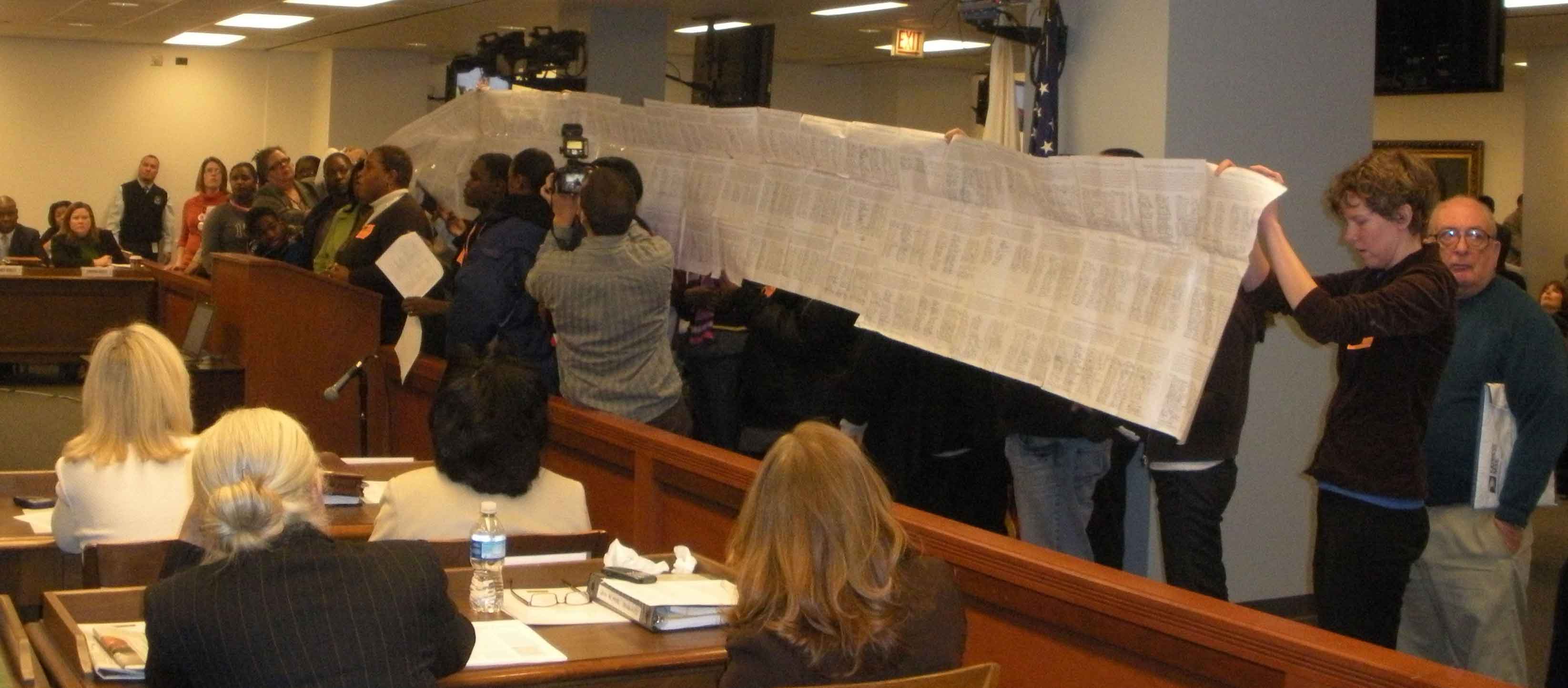 Two weeks before the City Hall protest, residents of Altgeld Gardens and their supporters presented the Chicago Board of Education with petitions signed by more than 1,500 people demanding that Carver High School be returned, at least in part, to the community. Above, members of the group that organized the proposal for the environmental high school stand with Cheryl Jackson while she explains the proposed change for Carver High School to the members of the Chicago Board of Education on December 16, 2009. Substance photo by George N. Schmidt.Parents are not willing to accept transfers to other schools where the distance may be greater, educational services no better and the safety issue not resolved. The parents have placed an interim proposal in front of the Board until a fully functioning school can be established in the fall of 2010. They are asking for 4 or 5 classrooms to be staffed by certified, union teachers (the Board wants these to be associated with another CPS school, acting as a “satellite.”). But, as Ms. Johnson reiterated, so far this is just words without action.
Two weeks before the City Hall protest, residents of Altgeld Gardens and their supporters presented the Chicago Board of Education with petitions signed by more than 1,500 people demanding that Carver High School be returned, at least in part, to the community. Above, members of the group that organized the proposal for the environmental high school stand with Cheryl Jackson while she explains the proposed change for Carver High School to the members of the Chicago Board of Education on December 16, 2009. Substance photo by George N. Schmidt.Parents are not willing to accept transfers to other schools where the distance may be greater, educational services no better and the safety issue not resolved. The parents have placed an interim proposal in front of the Board until a fully functioning school can be established in the fall of 2010. They are asking for 4 or 5 classrooms to be staffed by certified, union teachers (the Board wants these to be associated with another CPS school, acting as a “satellite.”). But, as Ms. Johnson reiterated, so far this is just words without action.
Last week, after the protests opposed a charter school in the community, the School Board showed their responsiveness . . . by approving the charter school. On December 30 parents and students again emphasized their desire for a public high school in their community. They were at Mayor Daley’s office perhaps because the Mayor’s office took control of the schools over 10 years ago and now is ultimately responsible. But the occasion for coming to Mayor Richard Daley was to show him directly that students do not have a school and do not even have a public library in their community that is accessible, and consequently cannot even use public access internet to keep up on their classes during the holiday break, to do research. A number of students spoke to the issue: they are behind in their classes and afraid of flunking. And so in a spirited display, the community residents and their supporters chanted demands to use Daley’s internet access.
It is not surprising that Mayor Daley did not come out to meet the protesters Wednesday. Nor is it surprising that he didn’t let them in to use his computer. It is also not surprising the the Board is delaying action as long as it can.
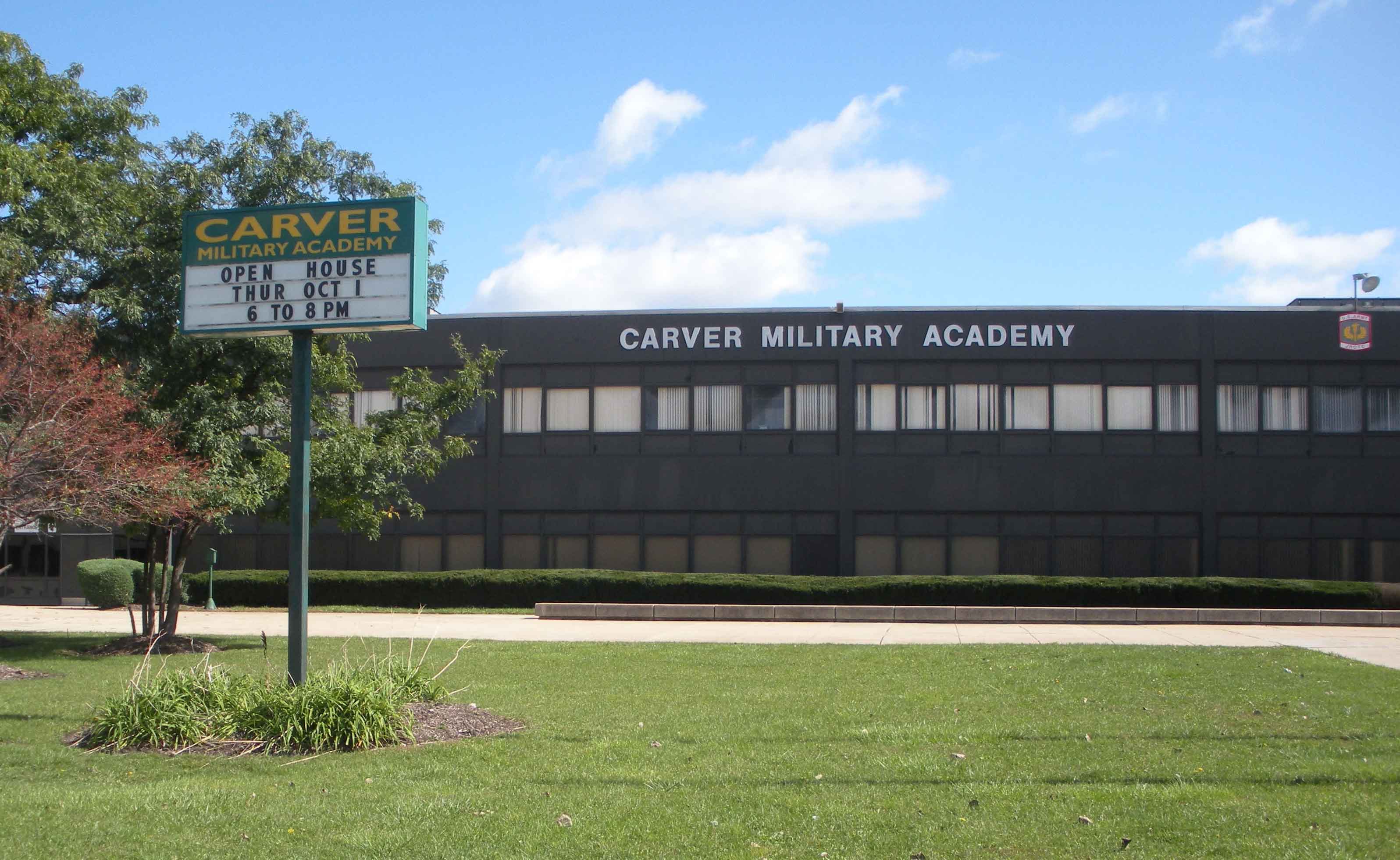 The front of the Carver Military Academy High School (above) one week after the brutal murder of Fenger High School junior Derrion Albert. Following the February 2006 vote of the Chicago Board of Education to turn Carver, which had been a general high school for 40 years, into a "Military Academy" (Army, one of four in Chicago), students who wished to attend a regular general public high school but lived in the Altgeld Gardens public housing project on the far south side of Chicago had to attend Fenger High School, nearly five miles and two busses away. Even with massive promotion in the community, Carver was never able to draw a significant number of students to the military program, leaving the building half empty (see next photo below) as the 2009 - 2010 school year began. Substance photo by George N. Schmidt.This will be a difficult fight to win, but the people in the community have expressed their willingness to fight this battle. It is literally a matter of life or death. But it also raises questions about how much the School Board is willing to concede, and how will they guarantee a quality education when they have proven how adept they are at dismantling public education in the guise of “No Child Left Behind.” The significance of winning this battle, even this limited one, is that the parents are taking the leadership in taking back from private hands a space that once was public — a school which was a public school, is now a military academy and is slated for charterization next year.
The front of the Carver Military Academy High School (above) one week after the brutal murder of Fenger High School junior Derrion Albert. Following the February 2006 vote of the Chicago Board of Education to turn Carver, which had been a general high school for 40 years, into a "Military Academy" (Army, one of four in Chicago), students who wished to attend a regular general public high school but lived in the Altgeld Gardens public housing project on the far south side of Chicago had to attend Fenger High School, nearly five miles and two busses away. Even with massive promotion in the community, Carver was never able to draw a significant number of students to the military program, leaving the building half empty (see next photo below) as the 2009 - 2010 school year began. Substance photo by George N. Schmidt.This will be a difficult fight to win, but the people in the community have expressed their willingness to fight this battle. It is literally a matter of life or death. But it also raises questions about how much the School Board is willing to concede, and how will they guarantee a quality education when they have proven how adept they are at dismantling public education in the guise of “No Child Left Behind.” The significance of winning this battle, even this limited one, is that the parents are taking the leadership in taking back from private hands a space that once was public — a school which was a public school, is now a military academy and is slated for charterization next year.
Note that GEM and CORE are planning a big event January 9, an educational summit at Malcolm X College, where the focus will be on school closings and charterization. The event will take place from 10 AM to 1PM. Child care will be available, and refreshments will be on hand.
* * * * * * * * * * * * * * * Parents, students ask city to reopen their Altgeld library branch 'Can we use your internet?' December 31, 2009 BY ROSALIND ROSSI Education Reporter Sun-Times
Fenger High School senior Kermilia Wellington wanted to spend her Christmas break at the local library, using the Internet to work on college applications -- but her neighborhood branch has been closed since March. "I'm trying to go to college, but I don't have a computer where I can apply to college," Kermilia said.
Chicago students and parents from the Altgeld Gardens housing development gather Wednesday at City Hall to demand that the city reopen their library branch, which was closed in March after a steam pipe burst. They also complained about the closing of their neighborhood high school. (Keith Hale/Sun-Times) So instead, she joined about two dozen other protesters from the Altgeld Gardens housing development who gathered outside Mayor Daley's City Hall office Wednesday to demand that Daley reopen the Altgeld Branch of the Chicago Public Library.
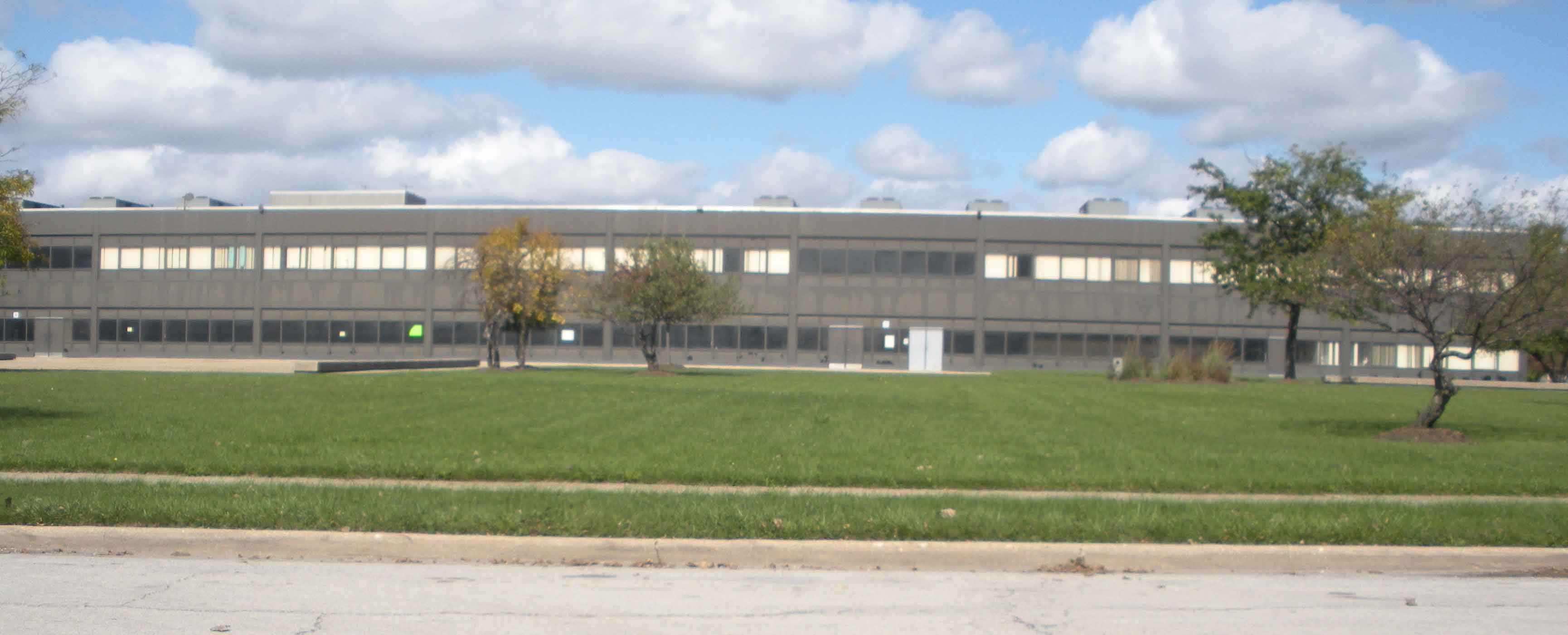 When Chicago Public Schools CEO Ron Huberman announces his annual "Hit List" of public schools to be closed, phased out, or tunrarounded on January 8, 2010 (his promised date), one of more than 50 schools that cannot be on the list is Carver Military Academy (above, the east wing in October 2009). Although Carver presently has approximately 500 students in a building that served more than 2,000 students during the 1970s and early 1980s (and could serve more than 1,000 students comfortably today), because it is now a "military academy" Carver is not itemized when the Board describes those schools which are, in Board parlance, "underutilized." The eastern section of Carver (in the above photograph) used to teem with students during Carver's days as a general high school. Today, many of the rooms are unused, while others are "underutilized" by any definition. Parents and students from Altgeld Gardens who are trying to have a general high school opened inside the Carver building have been told they may not visit inside the school, as they reported at a press conference on December 16, 2009, before the Board of Education meeting. Veteran teachers who taught at Carver during their careers told Substance that the building could easily house both the small military high school and an additional school, such as the general high school proposed by Altgeld residents. Substance photo by George N. Schmidt.The same group has complained about Daley's closing their neighborhood high school, causing friction that they say led to the September beating death of Fenger student Derrion Albert.
When Chicago Public Schools CEO Ron Huberman announces his annual "Hit List" of public schools to be closed, phased out, or tunrarounded on January 8, 2010 (his promised date), one of more than 50 schools that cannot be on the list is Carver Military Academy (above, the east wing in October 2009). Although Carver presently has approximately 500 students in a building that served more than 2,000 students during the 1970s and early 1980s (and could serve more than 1,000 students comfortably today), because it is now a "military academy" Carver is not itemized when the Board describes those schools which are, in Board parlance, "underutilized." The eastern section of Carver (in the above photograph) used to teem with students during Carver's days as a general high school. Today, many of the rooms are unused, while others are "underutilized" by any definition. Parents and students from Altgeld Gardens who are trying to have a general high school opened inside the Carver building have been told they may not visit inside the school, as they reported at a press conference on December 16, 2009, before the Board of Education meeting. Veteran teachers who taught at Carver during their careers told Substance that the building could easily house both the small military high school and an additional school, such as the general high school proposed by Altgeld residents. Substance photo by George N. Schmidt.The same group has complained about Daley's closing their neighborhood high school, causing friction that they say led to the September beating death of Fenger student Derrion Albert.
On Wednesday, their angry chants echoed through empty halls: "We don't have a library. We don't have a school. So Mayor Daley, what do you want us to do?''
When a press secretary emerged to find out their demands, one student screamed, "Can we use your Internet?" Other protesters quickly took up that message as their new chant.
Some kids needed the Internet to work on college applications. Others wanted to prepare for college admission tests. Still others said they have homework that demands Internet access.
Going to libraries outside Altgeld requires travel through dangerous areas, said Altgeld parent Cheryl Johnson. To get to one, at 119th and Halsted, kids have to take three buses and walk six blocks, Johnson said.
The Altgeld Branch, in a Chicago Housing Authority building at 132nd and Ellis, was closed in March after a steam pipe burst. One of three estimates put repairs at $500,000, a CHA spokesman said. The Chicago Public Library hopes to open a new Altgeld branch by summer in an empty wing of the Wheatley Child Parent Center at 133rd and Corliss, library officials said.
Chicago Public Schools would renovate the wing and rent it to the library, which would help with renovation costs, Library Commissioner Mary Dempsey said.
The CHA hopes to open a computer center, using 30 used computers rehabbed by trained CHA residents, in January in the Altgeld Community Center at 951 E. 132nd Pl., CHA officials said.
But all of that comes too late for kids who need the Internet now. Said Johnson: "If [a burst pipe] happened in another community, it would have been repaired by now.''
* * * * * * * * * * * * * * *
Students try to get into Daley's office... to use his Internet Jennifer O'Neill Reporting WBBM Newsradio 780
CHICAGO (WBBM) -- A group of about two dozen Fenger High School students and parents tried to get into Mayor Richard M. Daley's office this afternoon to use his Internet access.
They were calling attention to the fact that they don't have access to a library, since the one at the Altgeld Gardens CHA housing development where they live was shut down last spring because of flooding.
Daley was not available to address the crowd, but spokesman Lance Lewis says the CHA and Chicago Public Library System have been working with community groups to open a new library in the new year. He says there also are plans in the works to open a new charter school in the neighborhood.
But the group says it doesn't want another charter school and it can't wait until next school year to have access to a safe school with quality education.
* * * * * * * * * * * * * * *
Fenger High School students protest at mayor's office over lack of library near Altgeld Gardens -- Chicago Tribune kmack@tribune.com (also on Breaking News)
Altgeld residents also left without neighborhood school
Kermilia Wellington, a senior at Fenger High School, wants to go to Southern Illinois University next year, but she doesn't have access to a computer to fill out the online application. "It's too late to apply to most schools. If I can't do it in time, I'm going to the Navy," said Wellington, 18, whose neighborhood library in the Altgeld Gardens public housing complex has been closed since it flooded in March. The closest library is now two bus rides away, she said.
Wellington was among 20 Fenger students who showed up at Mayor Richard Daley's office Wednesday to protest the lack of a neighborhood library and school.
Daley was not in his office, but a representative briefly came out to hear the students' concerns. Wellington handed him a copy of a poem that read: "We don't have a library, we don't have a school, so Mayor Daley, what do you want us to do? We don't want to rob, we don't want to steal, and we are tired of seeing teens get killed."
Students who live in Altgeld have been assigned to Fenger since 2006, when their neighborhood high school was turned into a selective-enrollment military academy. There have been long-running tensions between students who live near Fenger and those who are bused from Altgeld. That feud contributed to the beating death of student Derrion Albert in September.
Several Altgeld parents and students said they still want a neighborhood school. Chicago Public Schools said 10 students have accepted an offer for a midyear transfer to Carver Military, and the district will give Altgeld students priority when a charter high school near the housing complex opens next school year. Altgeld residents have gone without a library for nine months, after a pipe burst in their local facility. The Chicago Public Library system said Wednesday it has found a new nearby location for a library -- at the Wheatley Child Parent Center -- that should open before the summer.
"We have been actively looking for other alternatives in the neighborhood while we were waiting on CHA to renovate," said Ruth Lednicer, the library spokeswoman. Lednicer said she understands it is inconvenient for residents to travel to another location, but the "payoff will be worth it."
* * * * * * * * * * * * * * * Students: Fenger unsafe By Katy Yeiser December 30, 2009 @ 3:30 PM
Parents, students and community members of a South Side neighborhood brought their demands for a new school and library to Mayor Richard M. Daley's doorstep this morning.
About two dozen residents of the Altgeld Garden neighborhood demonstrated outside the mayor's City Hall office. They're asking for repairs to their library, which was damaged in a spring flood.
Without it, they say, students no longer have a place to access the Internet, do homework and prepare for college-preparatory exams.
They also continued to speak out in favor of a new neighborhood school, which they proposed at this month's school board meeting. Students from the area attend Fenger High School, which residents say has become increasingly dangerous since the beating death this fall of student Derrion Albert.
The proposed new school would be located in the closer Carver Military Academy.
Protesters spent a few minutes this morning at the mayor's door, calling for him to come out and speak with them.
"We don't have no library. We don't have no school. So, Mayor Daley, what you want us to do?" they said.
Residents have been asking to meet with the mayor since Albert's death, says Cheryl Johnson, executive director of People for Community Recovery.
The mayor has instead delegated staff members to hear concerns. Daly wasn't available Wednesday morning, butspokesman Lance Lewis talked briefly with the protesters.
"I feel like Fenger is not a safe environment," student Deontea Jones told Lewis. "We need some type of support and (the mayor) needs to get back to us as soon as possible."
Lewis took a statement from the community addressed to the mayor and left after about 10 minutes. Community members still want to meet with Daley, Johnson says.
"We're tired. We need some action," Johnson says.
About a dozen Fenger students came to the protest and expressed their frustrations over not having a library or neighborhood school. For the students in Altgeld Gardens, getting to school everyday means taking two buses and walking across gang lines.
"It's not fair that they have to cross gang lines and have their lives threatened to get an education," says Aisha Elamin, who is a member of the University of Chicago's Teachers for Social Justice.
Fenger's environment wasn't as hostile in the beginning of the school year, freshman Jontell Laws says. But violence in the school grew after Albert's death.
"It's escalated to everybody getting jumped on. It's gotten worse and worse," Laws says.
Alton Spikes is also experiencing violence in his first year of high school. Spikes says he has been in fights and been jumped at school more than once. Although security has increased since Albert's death, violence still exists, Spikes says.
"It doesn't help," he says.
Spikes is attempting to transfer out of the school, and more than 150 have asked to transfer, CPS Chief Administrative Officer Robert Runcie said at this month's school board meeting.


By: truth seeker
solutions possible now?
I'm wondering what happened to the books in the library which had the broken water pipe. Did any of them survive? Could there at least be bookmobile service a few days a week to offer access to books and interlibrary loan? Is there a social room in Altgeld that could serve as a temporary facility until an appropriate facility can take over on a more permanent basis? It seems ridiculous and criminal that something has not been done.
As for internet service, has everyone forgotten how easy it is to use existing building wiring(power/coax) or wireless networking to quickly distribute internet access? Did anyone look into compelling CHA to share the T1 line that probably is connected to the administrative facility as the basis for the service which could be distributed? Has anyone offered to get computers into apartments or a social room at Altgeld to get access to the kids who need to do their college applications?
Practical easily implemented solutions exist to address interim acute needs. Why is there no action?